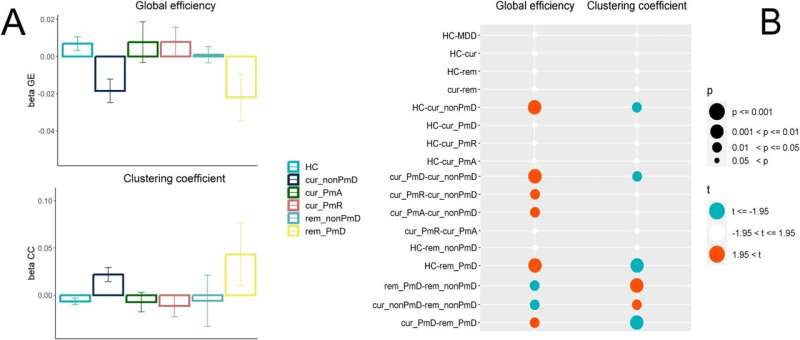This article has been reviewed according to Science X's editorial process and policies. Editors have highlighted the following attributes while ensuring the content's credibility:
fact-checked
peer-reviewed publication
trusted source
proofread
Neural mechanisms may serve as therapeutic target for depression

A recent study published in Molecular Psychiatry has identified previously unknown alterations in neural connectivity that promote psychomotor disturbance—a slowing or reduction in movement—in individuals with major depressive disorder.
"There seems to be a clear underlying pattern of brain connectivity that is tied to these motor features as well as to subtypes of depression. This could lead to new treatments (targeting motor function), as well as more accurate ways of defining and treating people with depression," said Vijay Mittal, Ph.D., professor of Medical Social Sciences of Psychiatry and Behavioral Sciences, who was a co-author of the study.
Stewart Shankman, Ph.D., the Dunbar Professor of Bipolar Disease and a professor of Psychiatry and Behavioral Sciences, was a co-author of the study.
Approximately 280 million people worldwide live with major depressive disorder (MDD), according to the World Health Organization, and may experience a range of symptoms, including disrupted sleep, poor concentration, feelings of low self-worth, as well as psychomotor disturbance.
Up to 70 percent of individuals with MDD experience psychomotor disturbance, presenting as either psychomotor retardation—a reduction in movement and activity—or psychomotor agitation—repetitive movements resulting in restlessness.
Psychomotor disturbance has previously been associated with a higher severity of MDD and poorer response to antidepressant treatments. However, the underlying neural mechanisms have remained poorly understood.
In the current study, a total of 699 participants with remitted or current depression and 820 healthy controls were categorized into displaying psychomotor retardation, psychomotor agitation, or no psychomotor disturbance.
MRIs of each participant were then compared to determine functional connectivity between different sections of the brain's cerebral motor network, which included the primary motor cortex, supplementary motor area, sensory cortex, superior parietal lobe, caudate, putamen, pallidum, thalamus, and cerebellum.
Overall, participants with psychomotor retardation only had higher thalamo-cortical connectivity, while those with psychomotor agitation had higher pallido-cortical connectivity. Participants with current MDD but without psychomotor disturbance also showed higher thalamo-cortical, pallido-cortical, and cortico-cortical connectivity, as well as higher alterations in overall network connectivity compared to controls.
Remitted patients with psychomotor disturbance showed no differences in single connections but differences in overall network connectivity, while remitted patients without psychomotor disturbance demonstrated connectivity signatures similar to the control group.
Moving forward, Mittal said his team hopes to repeat the study with multimodal neuroimaging and clinical assess participants' motor symptoms to determine the root causes of psychomotor retardation and psychomotor agitation.
More information: Florian Wüthrich et al, The neural signature of psychomotor disturbance in depression, Molecular Psychiatry (2023). DOI: 10.1038/s41380-023-02327-1



















